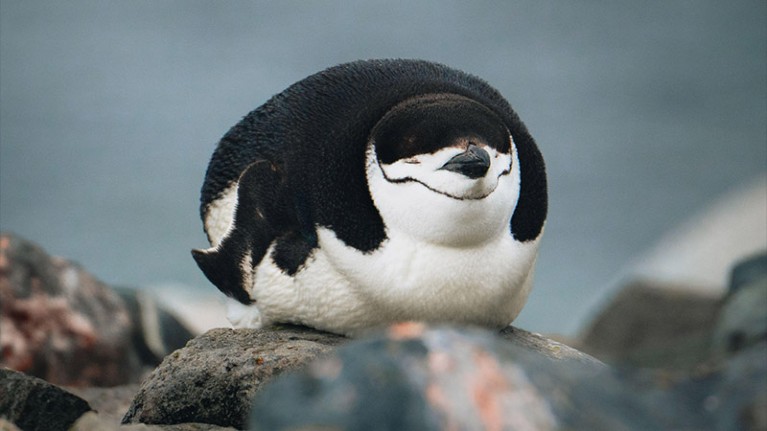A chinstrap penguin sleeps on a beach in Antarctica.Credit: Mathias Rhode/Alamy
Dozing off while reading a book or working at a computer is a familiar experience to many of us. Birds are also known to engage in these ‘microsleeps’ — but one species seems to have mastered the art of the brief slumber.
Chinstrap penguins (Pygoscelis antarcticus) nod off more than 10,000 times a day for an average of 4 seconds at a time, researchers have found. The short snoozes, which add up to more than 11 hours of daily sleep, seem to be enough to fulfil at least some of the restorative functions of sleep, according to a study published today in Science1.
The authors studied 14 penguins nesting in a colony on King George Island, Antarctica. Over 10 days of observation, the birds never engaged in prolonged sleep. The longest nap registered was 34 seconds. “This is what was the most striking and interesting — the fact that they can deal with sleeping in a fragmented way continuously, day and night,” says co-author Paul-Antoine Libourel, a sleep ecophysiologist at the Neuroscience Research Center of Lyon in Bron, France.
Chinstrap naps
To collect data on brain activity, the researchers implanted electrodes inside the penguins’ skulls. This allowed the scientists to identify when the birds entered a state of slow-wave sleep, which is the dominant form of sleep in birds and also occurs in humans.
Penguins engaged in more than 600 short bouts of slow-wave sleep per hour. These bouts became even shorter and more frequent when the birds were caring for eggs, perhaps because they need to be more alert while incubating, the researchers say.
No rest for the weary: a chinstrap parent tries to catch a few winks while caring for wide-awake chicks.Credit: Won Young Lee
Biologist Madeleine Scriba, based in Ettenhausen, Switzerland, says it was already known that birds sleep in shorter bursts than mammals. But she expected that at least some amount of continuous sleep would be necessary for physical and mental recovery. “That these penguins are doing very well with such short sleep bouts is really amazing,” she says.
Scientists are now interested in the implications for understanding of sleep in general. Tessa van Walsum, a marine biologist based in London, notes that even frequent naps don’t sound very restful if an average microsleep lasts around 4 seconds. “How would this then build up? And would they find a difference for non-breeding birds?” she asks.
The authors suggest that if microsleep can indeed be restorative, perhaps other creatures also rely on it to obtain rest in situations where they need to remain vigilant. “We don’t know whether the benefits of microsleep are the same in penguins and other mammals [such as] rats and humans,” Libourel says. But “the study shows that at least one species is able to sleep like this and behave normally, so I don’t see why other species couldn’t evolve the same sleep adaptation.”
